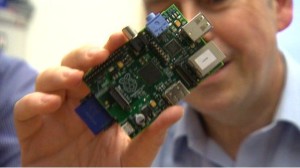Raspberry Pi mobile network?
 An IT consulting and technology firm in Cambridge has managed to get a mobile network up and running on a Raspberry Pi board. PA Consulting Group has won numerous awards for its innovative projects before but the latest hack is probably the most impressive. They’ve managed to get a full-blown GSM cell base-station to run on the $25 computer.
An IT consulting and technology firm in Cambridge has managed to get a mobile network up and running on a Raspberry Pi board. PA Consulting Group has won numerous awards for its innovative projects before but the latest hack is probably the most impressive. They’ve managed to get a full-blown GSM cell base-station to run on the $25 computer.
The Raspberry Pi is a tiny single-board computer that is very low priced yet have power features and hardware and can run Linux. When it was first released earlier this year, it made headlines and quickly sold out many times over. It has a speedy ARM processor, a USB port, HDMI interface and was designed to help today’s youth learn to do proper computer programming.
It was invented by Cambridge University professors who also work in the area’s Silicon Fen tech industry and has proven to be massively popular for a variety of inventive applications. It’s sold not-for-profit and people have used it to make a physical drum kit out of vegetables, a high altitude balloon (pretty much a do it yourself space probe) and a voice-controlled robot. It can even play Quake III.
However, this is the first time someone has managed to run a mobile phone network on the hardware. The idea was to show how you don’t always need expensive specialist hardware – sometimes, bulk-produced off the shelf solutions can be usable. This proof of concept demonstration shows that the cheap and minuscule computer can successfully do everything a base station needs to do such and route voice calls and text messages over a GSM network.
The method used open source software such as OpenBTS which implements the GSM mobile standard and FreeSWITCH which routes the traffic and interfaces the platform to the internet. It wasn’t that simple though, the engineers had to optimise the code for the Raspberry Pi. Check out this fascinating video for more:
What do you think? Is this just an interesting test or would it be possible to expand this to use in the real world? Are you tempted to get a Raspberry Pi or have you got one already? And what do you think the coolest thing someone’s done so far with these computers?
 An IT consulting and technology firm in Cambridge has managed to get a mobile network up and running on a Raspberry Pi board. PA Consulting Group has won numerous awards for its innovative projects before but the latest hack is probably the most impressive. They’ve managed to get
An IT consulting and technology firm in Cambridge has managed to get a mobile network up and running on a Raspberry Pi board. PA Consulting Group has won numerous awards for its innovative projects before but the latest hack is probably the most impressive. They’ve managed to get 


Recent Comments